Event Planner Template
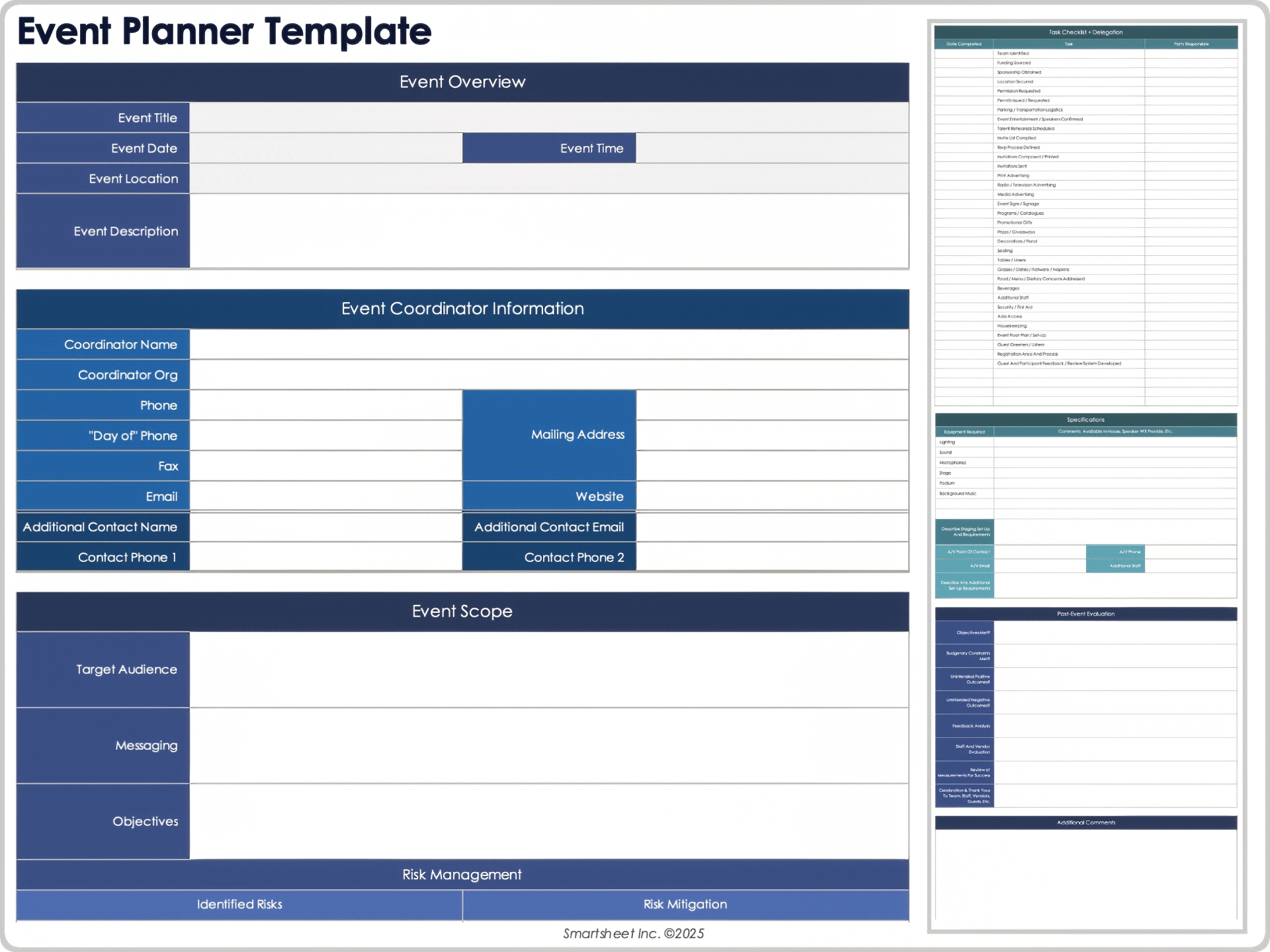
Download an Event Planner Template for
Excel
|
Microsoft Word
|
Adobe PDF
| Google Docs | Google Sheets
When to Use This Template: Use this event planner template to map out your entire event strategy from start to finish. It’s ideal when you need a centralized place to coordinate budget, vendors, deadlines, and team roles.
Notable Template Features: This template includes structured sections for an event overview, planning timeline, budget summary, vendor details, and key contacts. Fill it out and give it to stakeholders to keep everyone aligned.
For even more functionality — such as the ability to attach key documents and collateral to the plan and assign and automate tasks — try this event planning template in Smartsheet.
Event Schedule Template
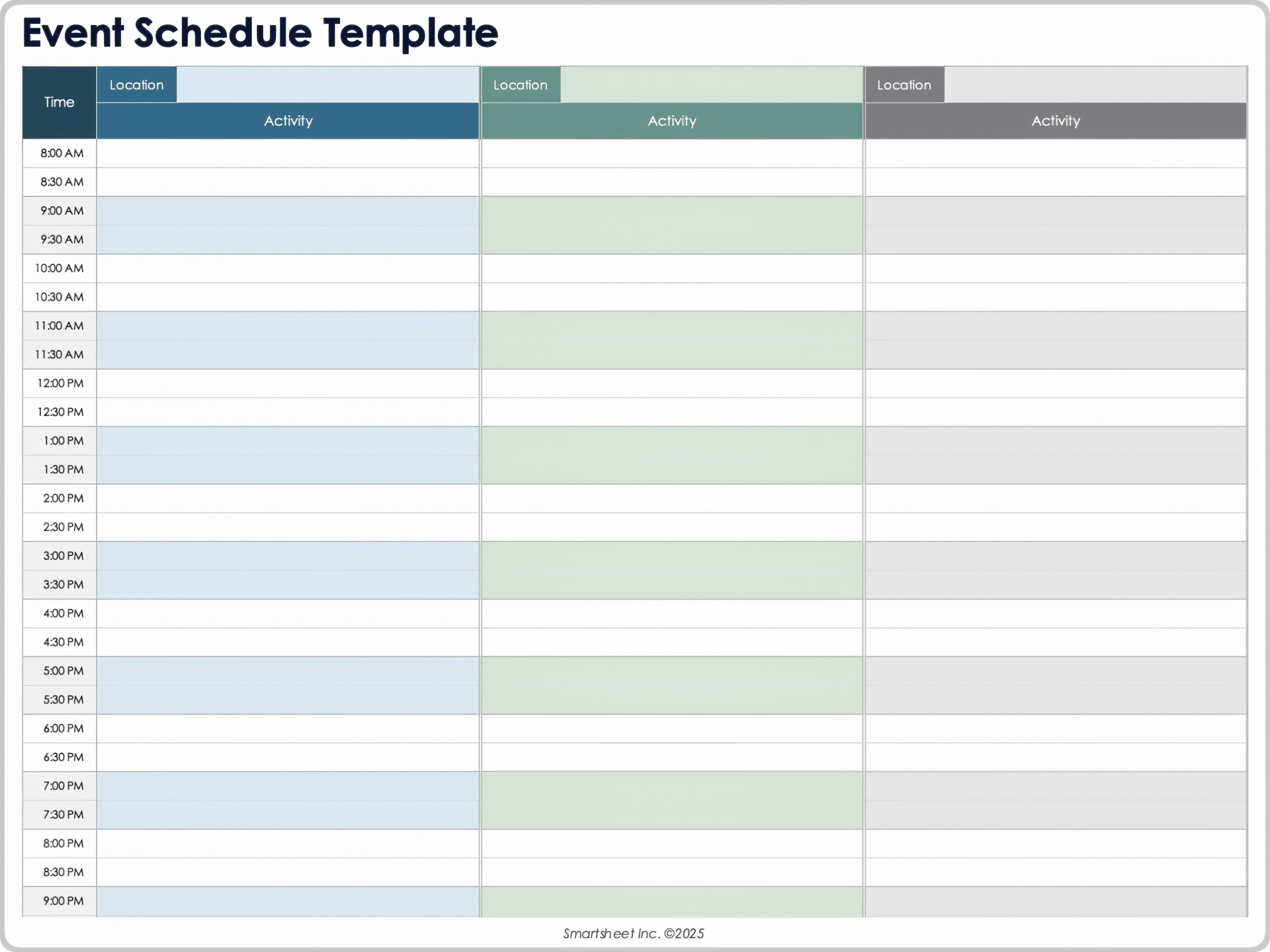
Download an Event Schedule Template for
Excel
|
Microsoft Word
When to Use This Template: This event schedule template helps users build a clear hour-by-hour rundown of activities, speakers, or sessions. It works best for events that require precise timing and tight staff coordination.
Notable Template Features: This template includes columns for time, activity, location, assigned lead, and additional notes. It allows planners to manage detailed schedules while ensuring everyone knows their roles.
Use this event schedule template in Smartsheet to plan activities at multiple locations, add contacts and notes, and view events in a calendar format.
Event Budget Template
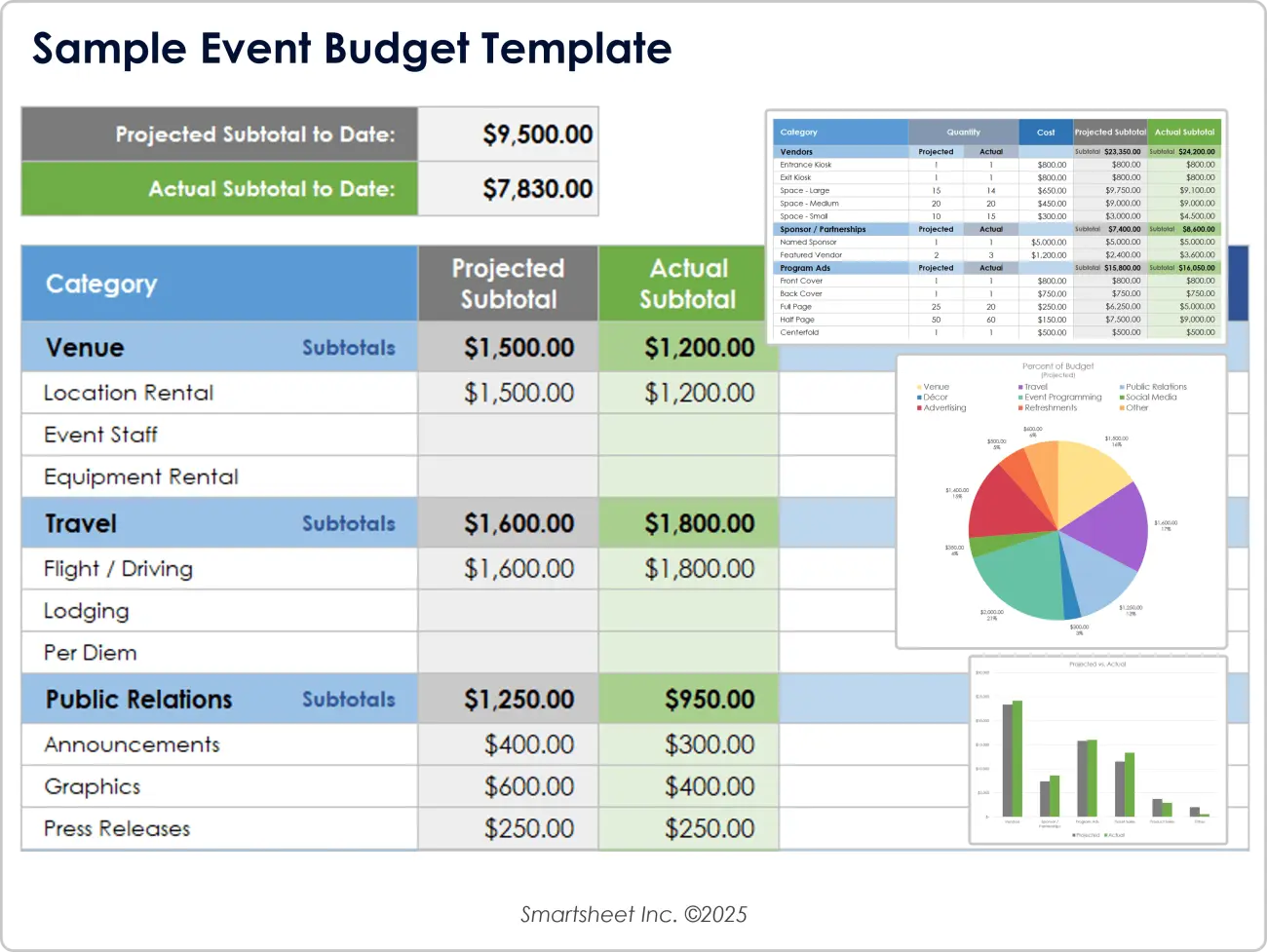
Download an Event Budget Template for
Excel
| Google Sheets | Smartsheet
When to Use This Template: Estimate and track every expense with this event budget template. It’s especially helpful for planners who manage limited budgets or need post-event financial reporting.
Notable Template Features: This template includes columns for category, estimated cost, actual cost, variance, and notes, plus automatic calculations for your event’s budget. It also offers a side-by-side comparison view that highlights overages and savings.
Event Checklist Template
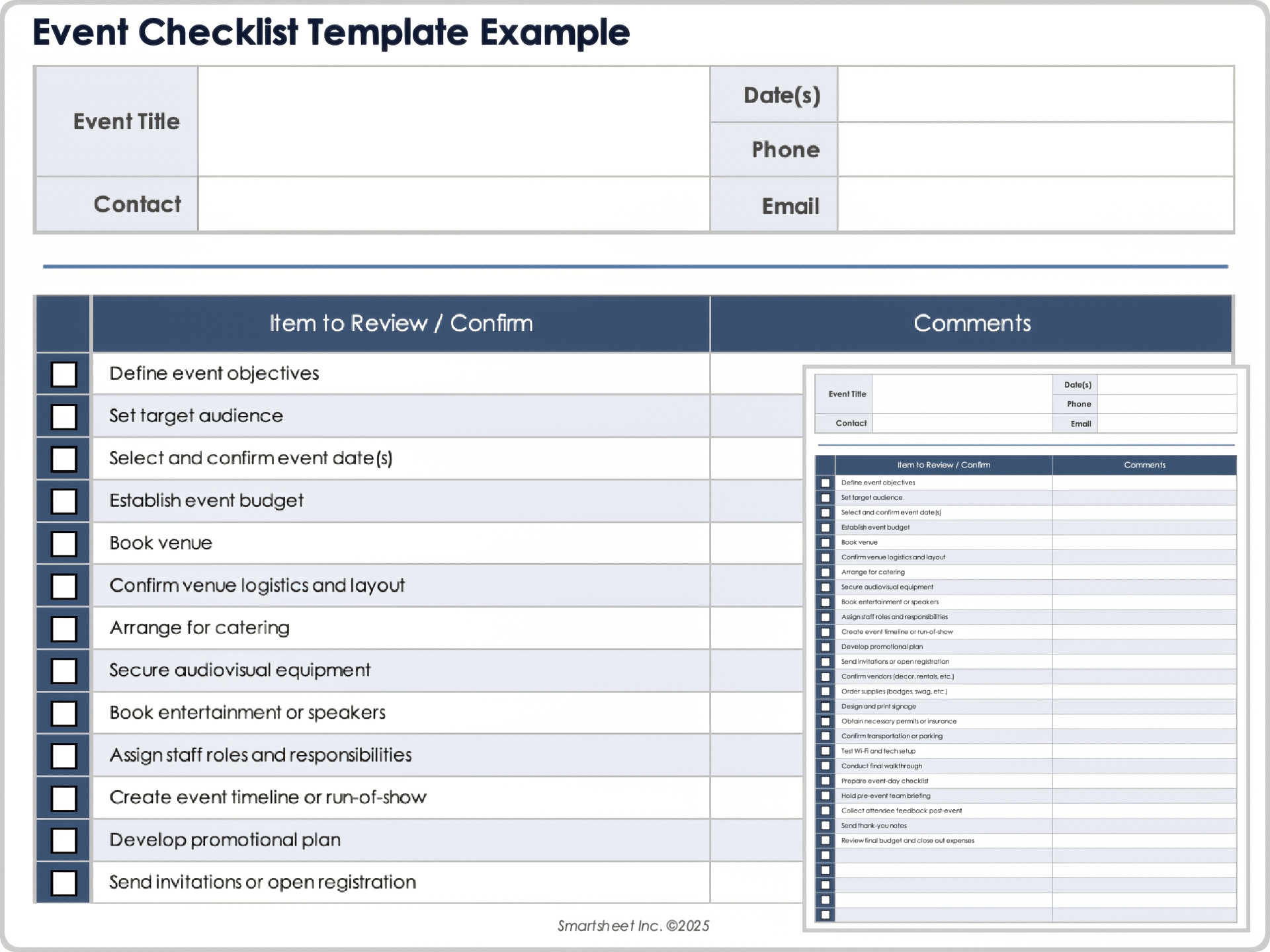
Download an Event Checklist Template for
Excel
|
Microsoft Word
|
Adobe PDF
When to Use This Template: This template is perfect for keeping tabs on every planning task, from initial outreach to event breakdown. It’s especially useful during final walkthroughs and day-of coordination.
Notable Template Features: This template includes two columns: one for items to review or confirm, and another for comments. The simple layout encourages real-time updates and accountability.
Event Timeline Template
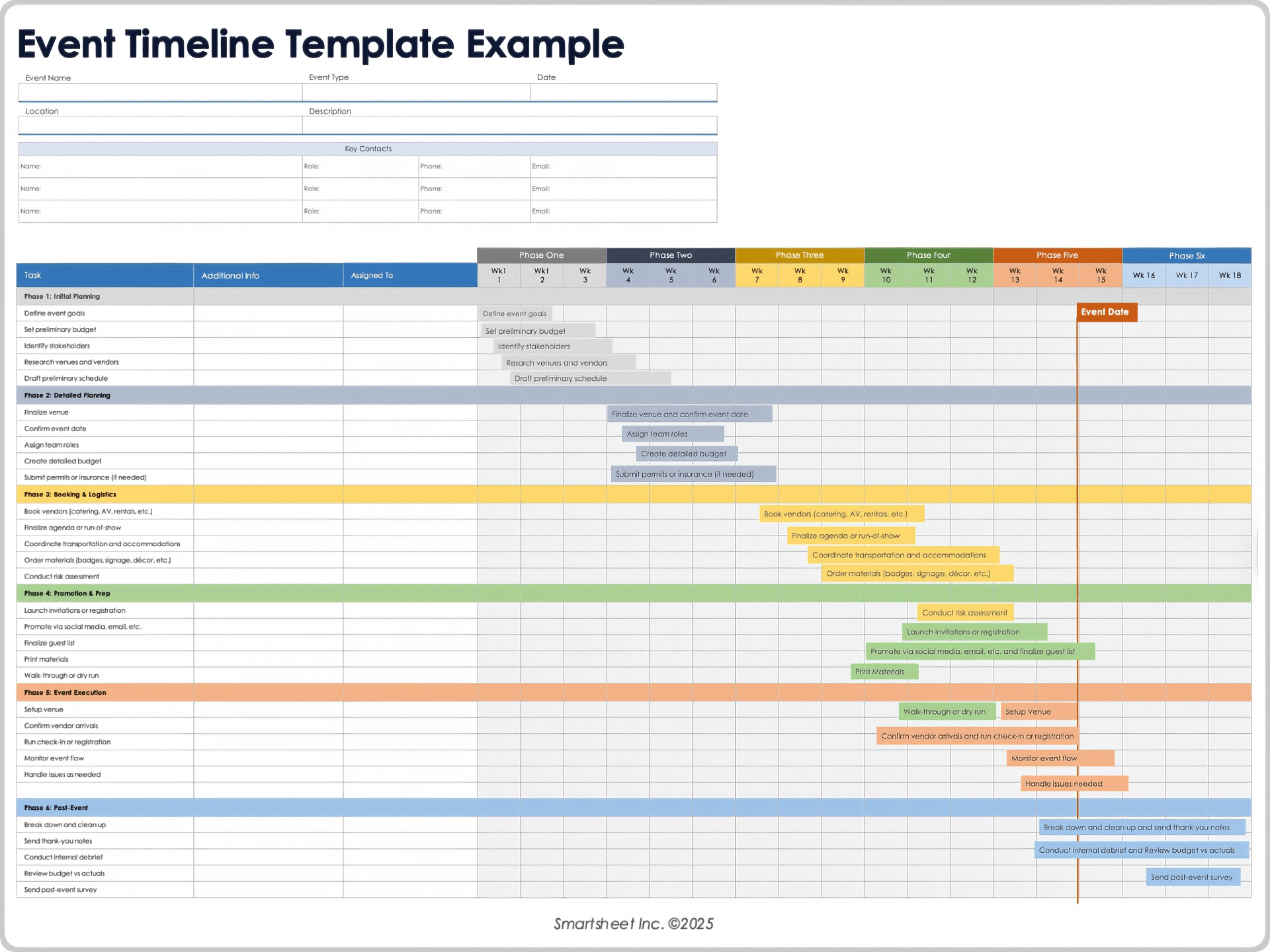
Download Blank and Sample Versions of an Event Timeline Template for
Excel
| Google Sheets
Download a Blank Event Timeline Template for
PowerPoint
| Google Slides
Download a Sample Event Timeline Template for
PowerPoint
| Google Slides
When to Use This Template: Use this event timeline template to map critical milestones and deadlines across planning phases. It’s ideal for long-term planning and ensuring deliverables stay on track.
Notable Template Features: This template includes timeline rows with fields for dates, tasks or milestones, owners, and statuses. The organized format makes it easy to track dependencies and progress.
Look through these event timeline templates to find more resources for event planning and scheduling.
Event Itinerary Template
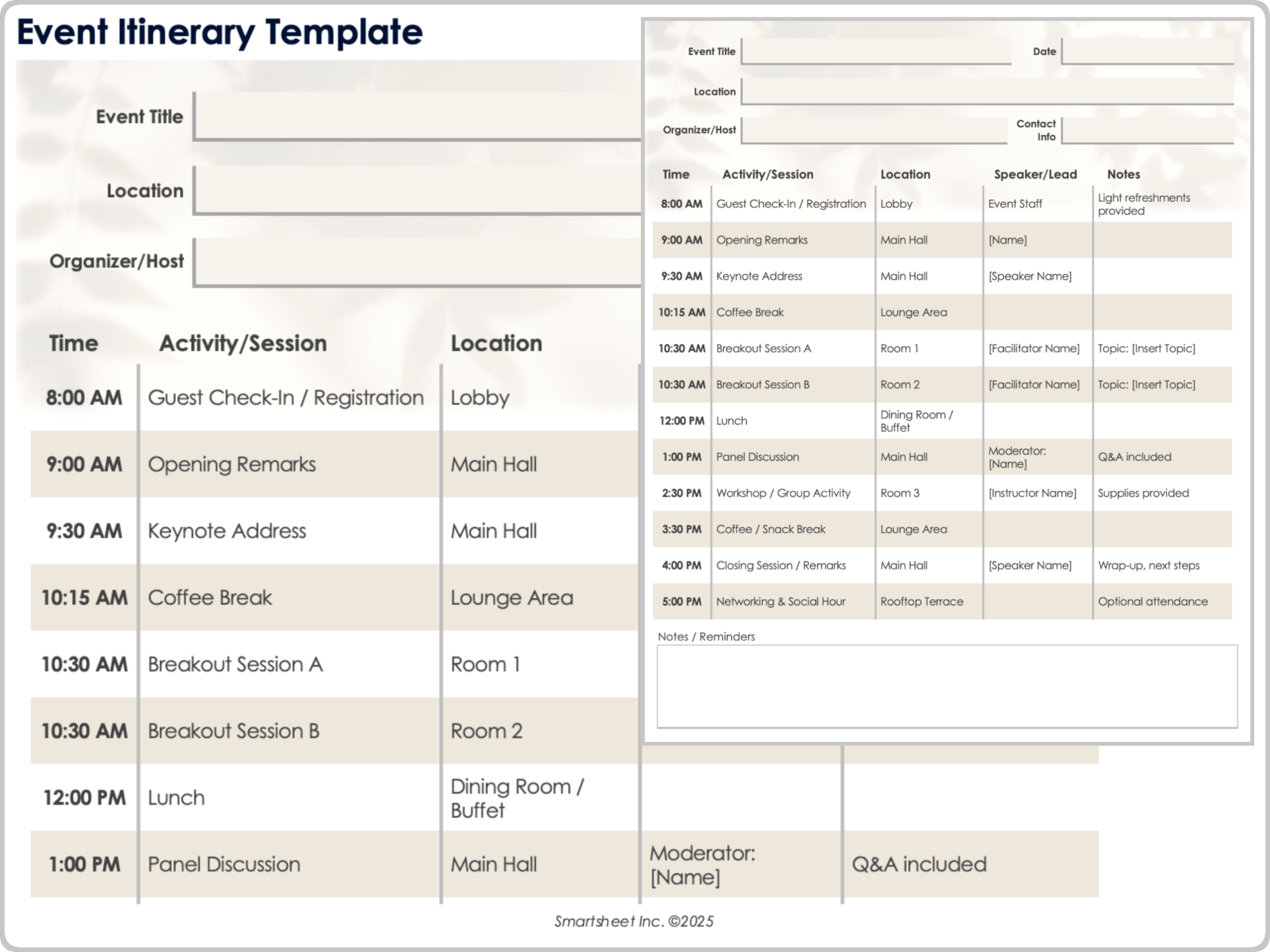
Download an Event Itinerary Template for
Microsoft Word
|
Adobe PDF
| Google Docs
When to Use This Template: Use this event itinerary template to guide attendees, staff, or speakers through the day-of schedule. It’s a great resource for events with tightly timed segments or multiple venues.
Notable Template Features: This template includes fields for time, activity, location, speaker or lead, and notes. It ensures everyone knows where to be and when, and it includes room for special instructions.
Event Registration Tracking Template
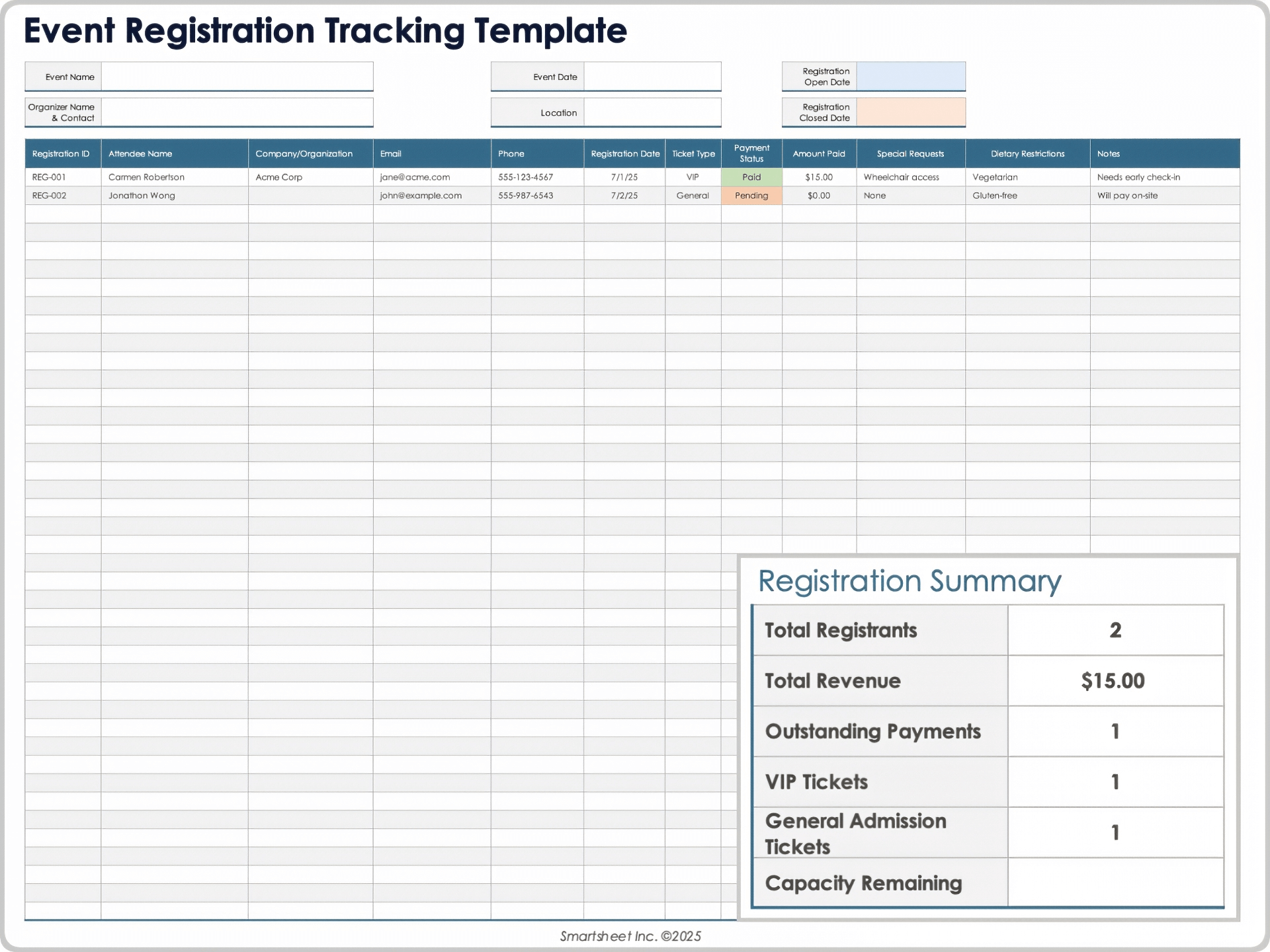
Download an Event Registration Tracking Template for
Excel
|
Microsoft Word
|
Adobe PDF
| Google Sheets
When to Use This Template: This registration tracking template is ideal when you need to log attendees, ticket types, and payments in one place. It’s especially helpful for managing guest lists and check-ins.
Notable Template Features: This template includes columns for registration ID, attendee name, email, phone, ticket type, amount paid, and special requests. It makes it easy to sort, filter, and follow up with registrants.
Vendor Management Template
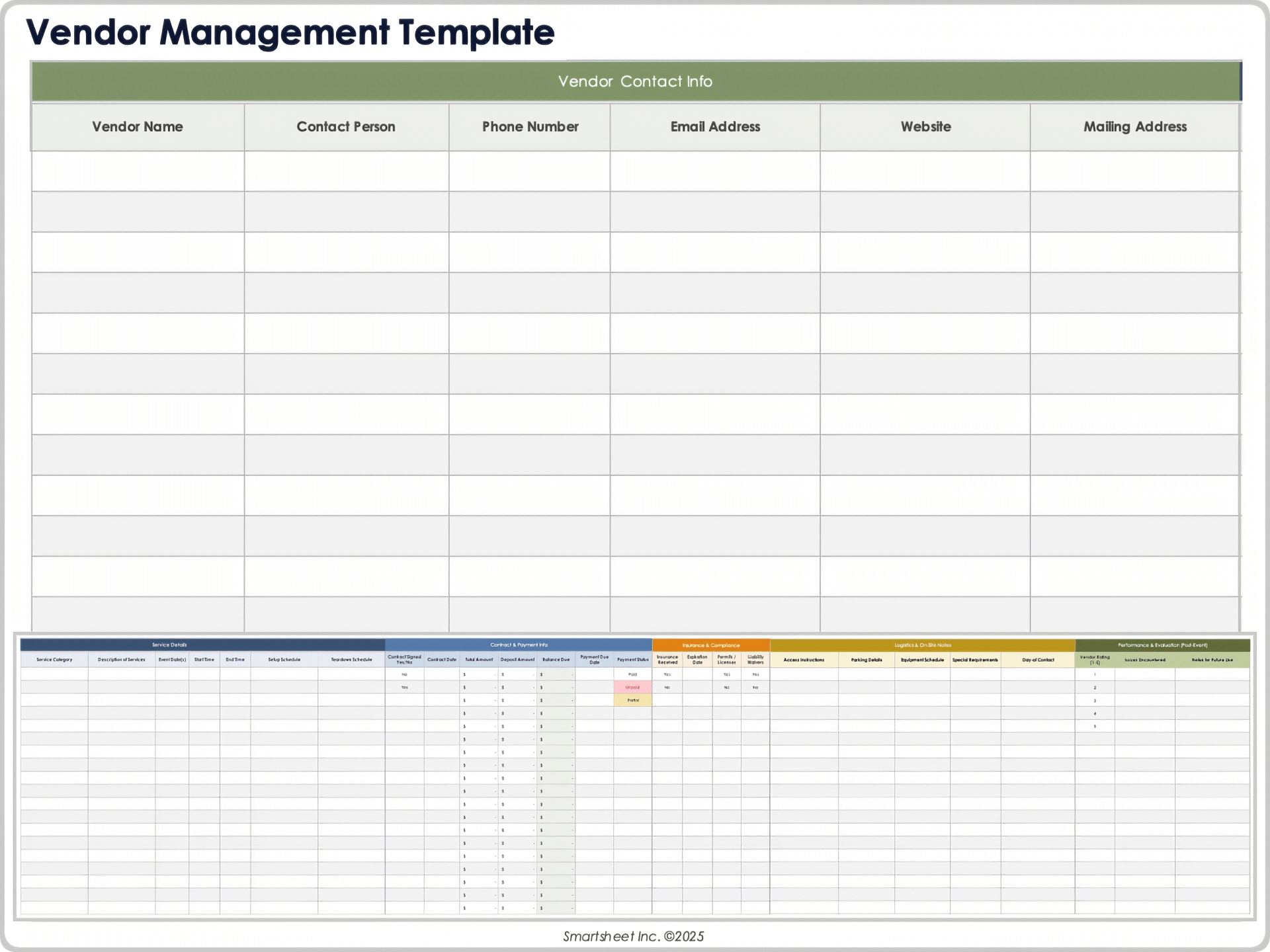
Download a Vendor Management Template for
Excel
| Google Sheets
When to Use This Template: Designed for events with multiple suppliers, contracts, or day-of logistics, this template helps users coordinate details on each vendor providing services for an event.
Notable Template Features: This template includes sections for vendor contact information, service category, contract and payment terms, insurance details, and performance notes. Fill out every section as you go, and you’ll never have to scramble to find vendor details again.
Explore these free event management resources to find additional tools to support budgeting, scheduling, registration, and vendor coordination.
Event Staffing Plan Template
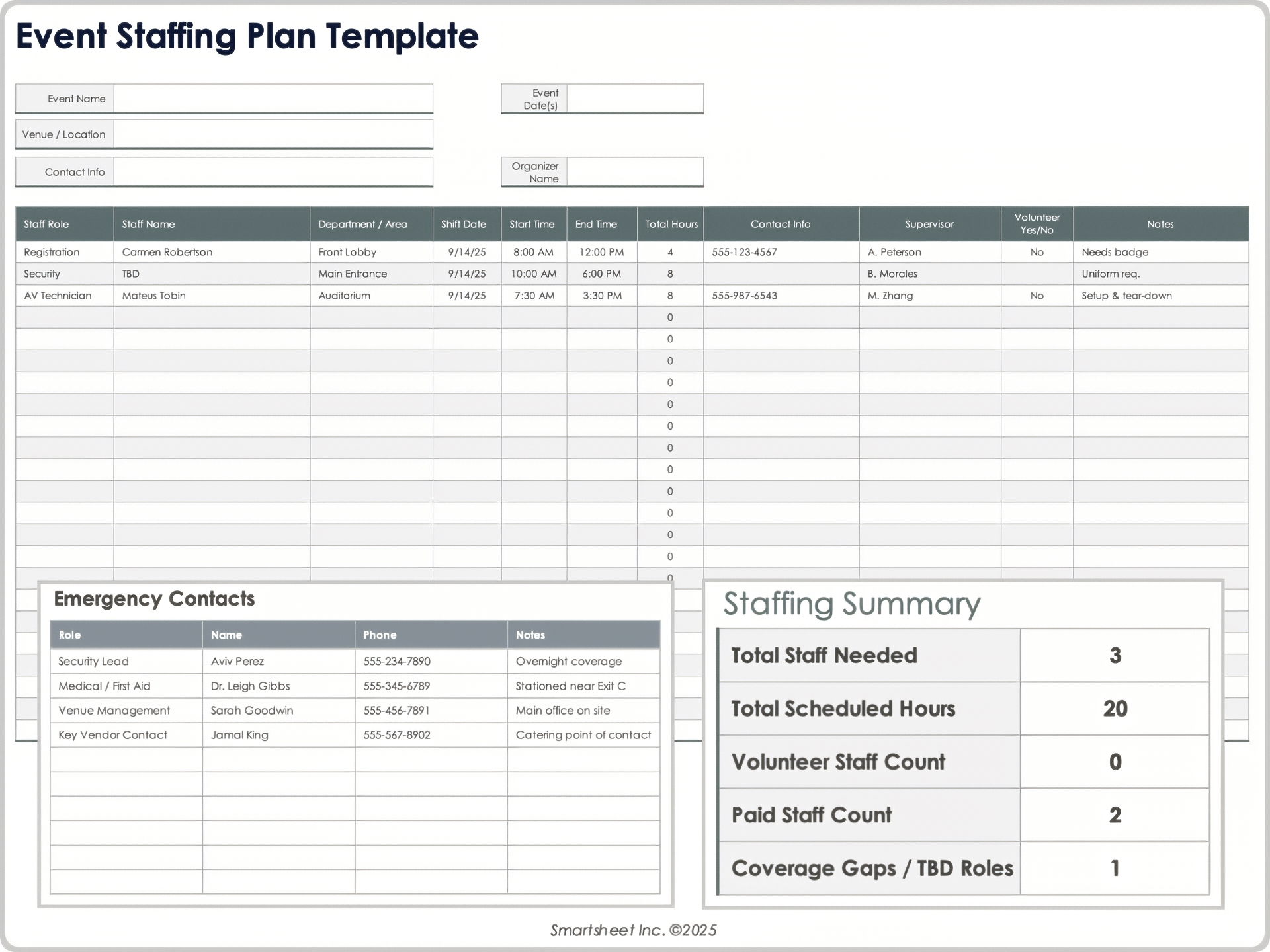
Download an Event Staffing Plan Template for
Excel
| Google Sheets
When to Use This Template: Choose this template when assigning and tracking staff or volunteer roles across your event schedule. It’s ideal for events with staggered shifts, multiple zones, or rotating coverage.
Notable Template Features: This template includes fields for staff member role, name, department, shift date, start and end times, supervisor, and notes. It gives planners a complete view of who’s where — and when.
For step-by-step guidance and more Smartsheet templates, explore these expert tips on event project management.
Event Risk Management Template
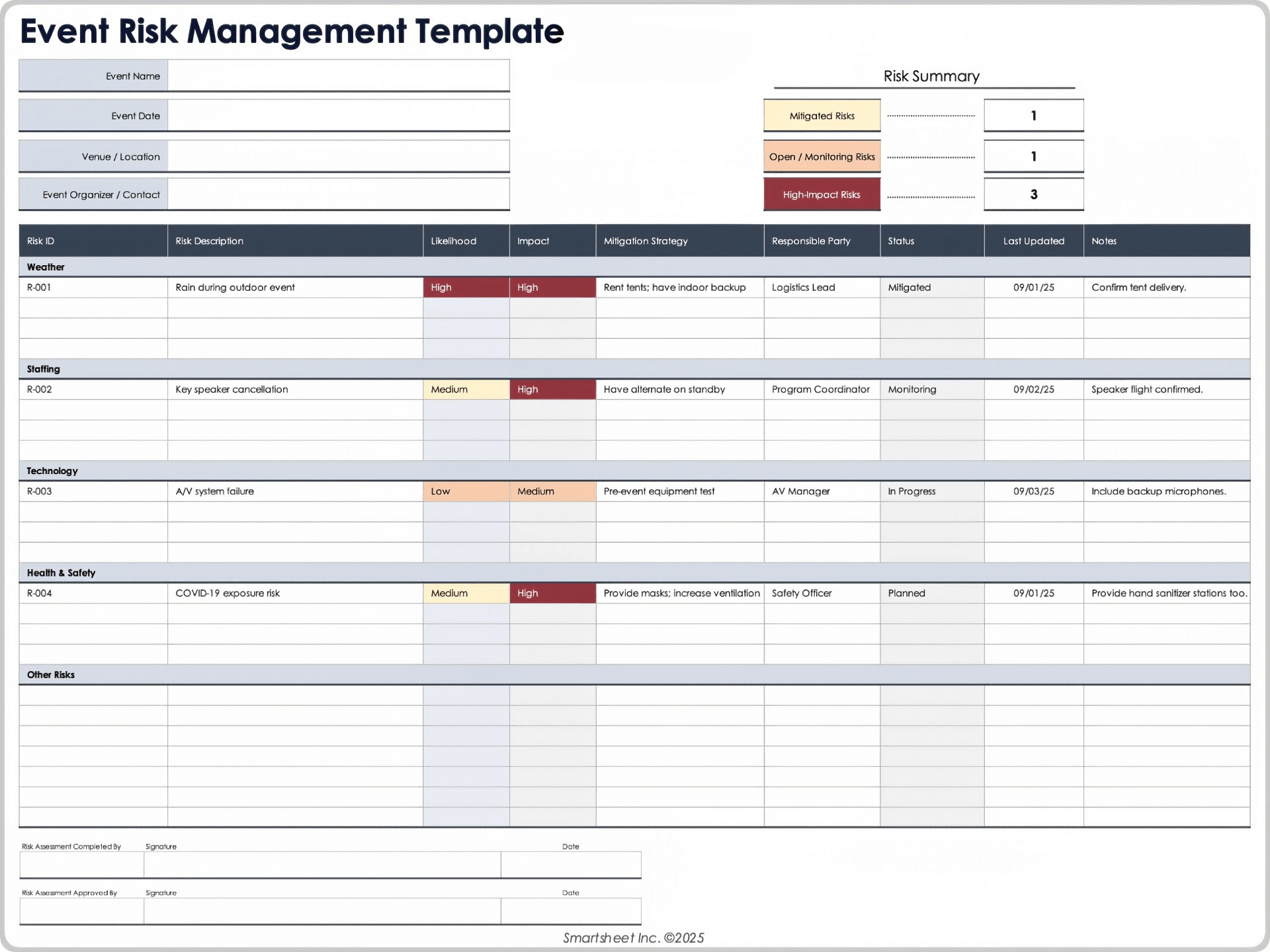
Download an Event Risk Management Template for
Excel
|
Microsoft Word
| Google Sheets
When to Use This Template: This risk management template helps you identify and plan for potential issues that could impact your event. It’s great for high-stakes events — such as large conferences — or venues with special requirements, such as historic sites or multi-room campuses.
Notable Template Features: This template includes fields for risk ID, category, likelihood, impact, mitigation strategy, and owner. The format makes it easy to flag and track risks before they become real problems.
Event Communication Plan Template
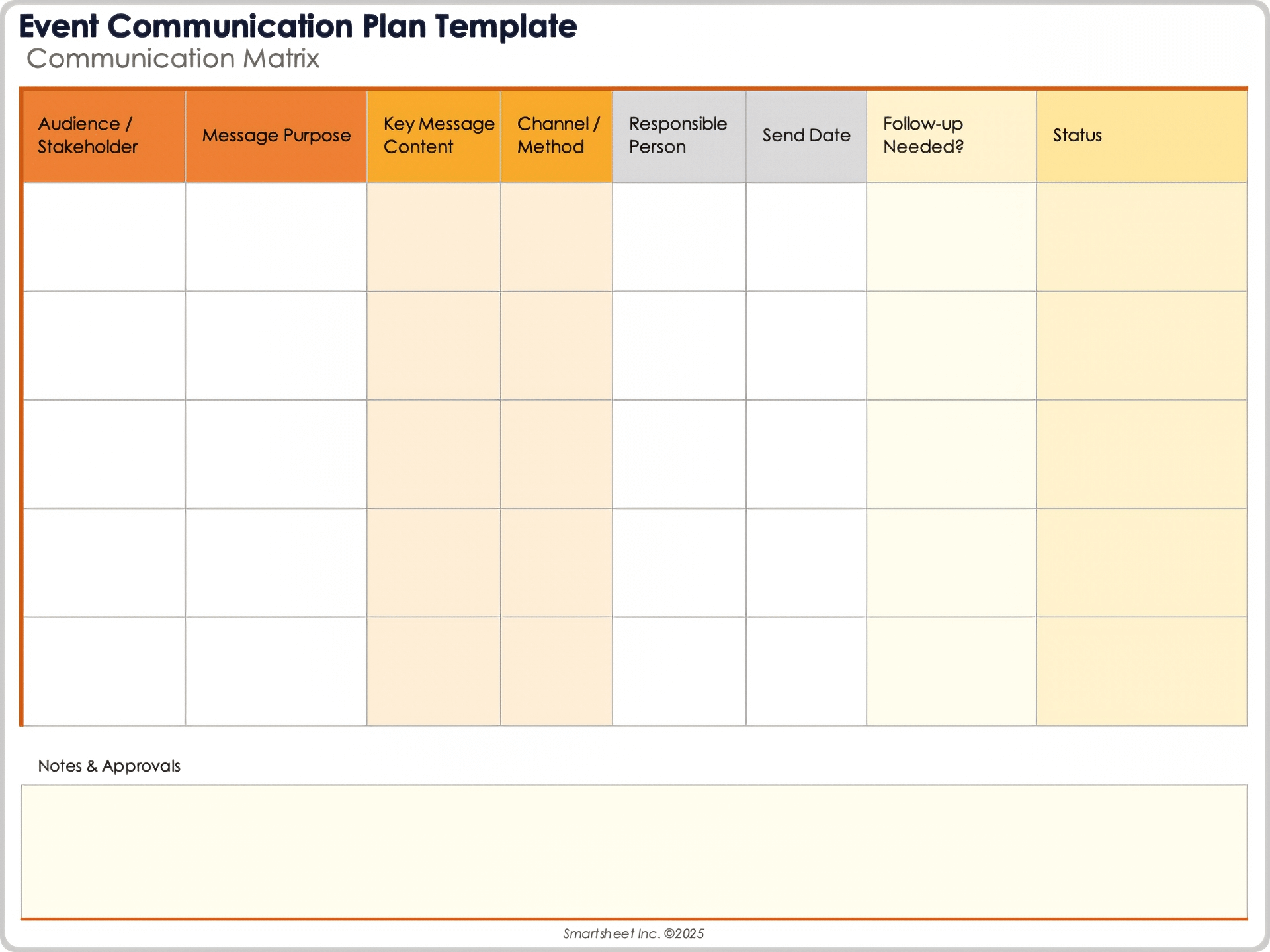
Download an Event Communication Plan Template for
Excel
|
Microsoft Word
| Google Docs | Google Sheets
When to Use This Template: Use this template to outline who needs what information, when they need it, and how it should be delivered. It’s perfect for coordinating updates across teams, vendors, and attendees.
Notable Template Features: This template includes fields for audience or stakeholder, message purpose, delivery method, responsible person, send date, and status. It helps prevent missed updates or miscommunication during fast-paced events.
Event Evaluation Template
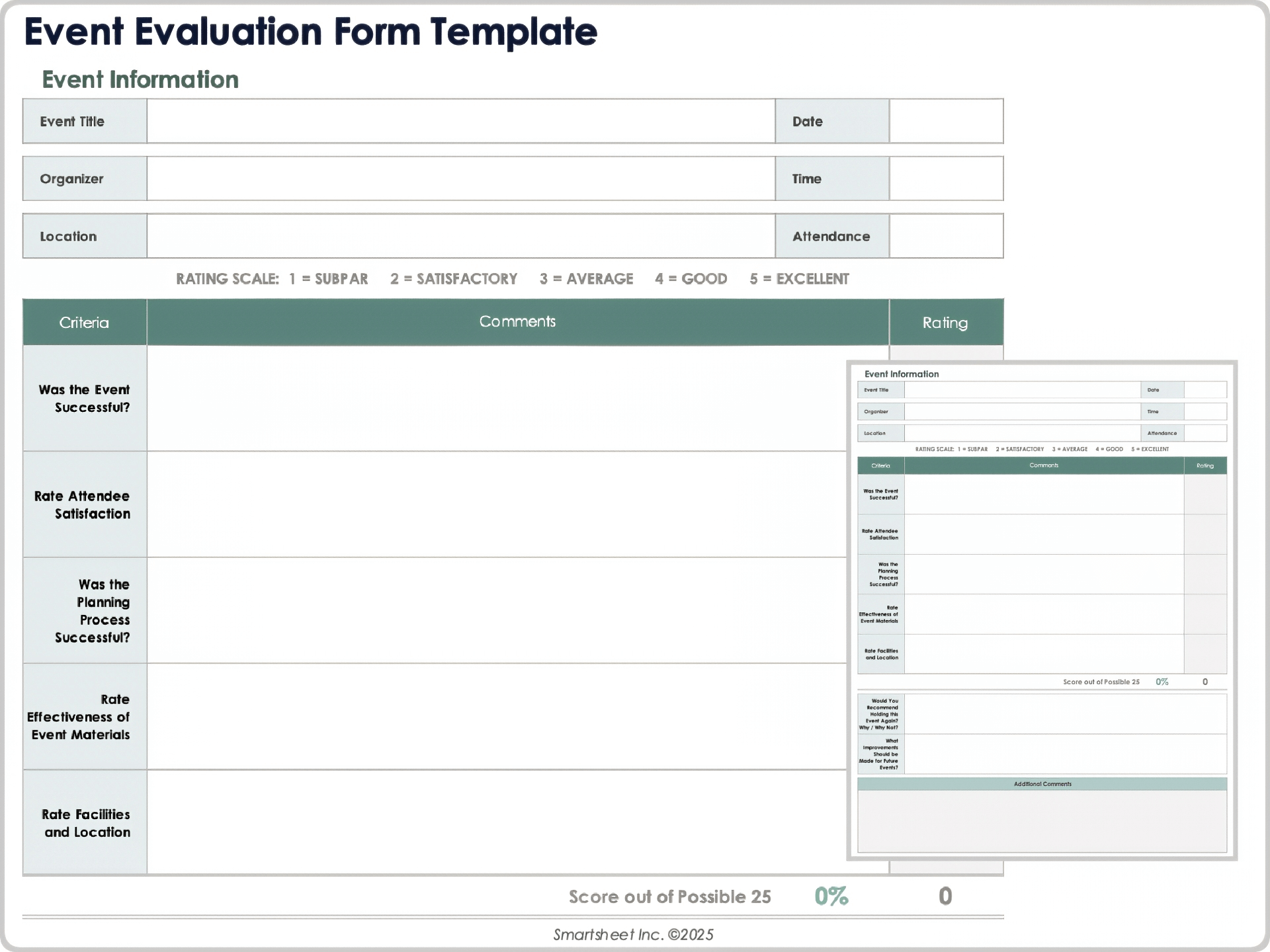
Download an Event Evaluation Template for
Excel
|
Adobe PDF
| Google Sheets
When to Use This Template: Use this template after your event to gather feedback, assess outcomes, and identify areas for improvement. It’s useful for internal debriefs or client reporting.
Notable Template Features: This template includes sections for evaluation criteria, ratings on a scale from one to five, comments, team feedback, and next steps. It gives you a clear, structured way to reflect and refine for your next event.
Wedding Budget Template
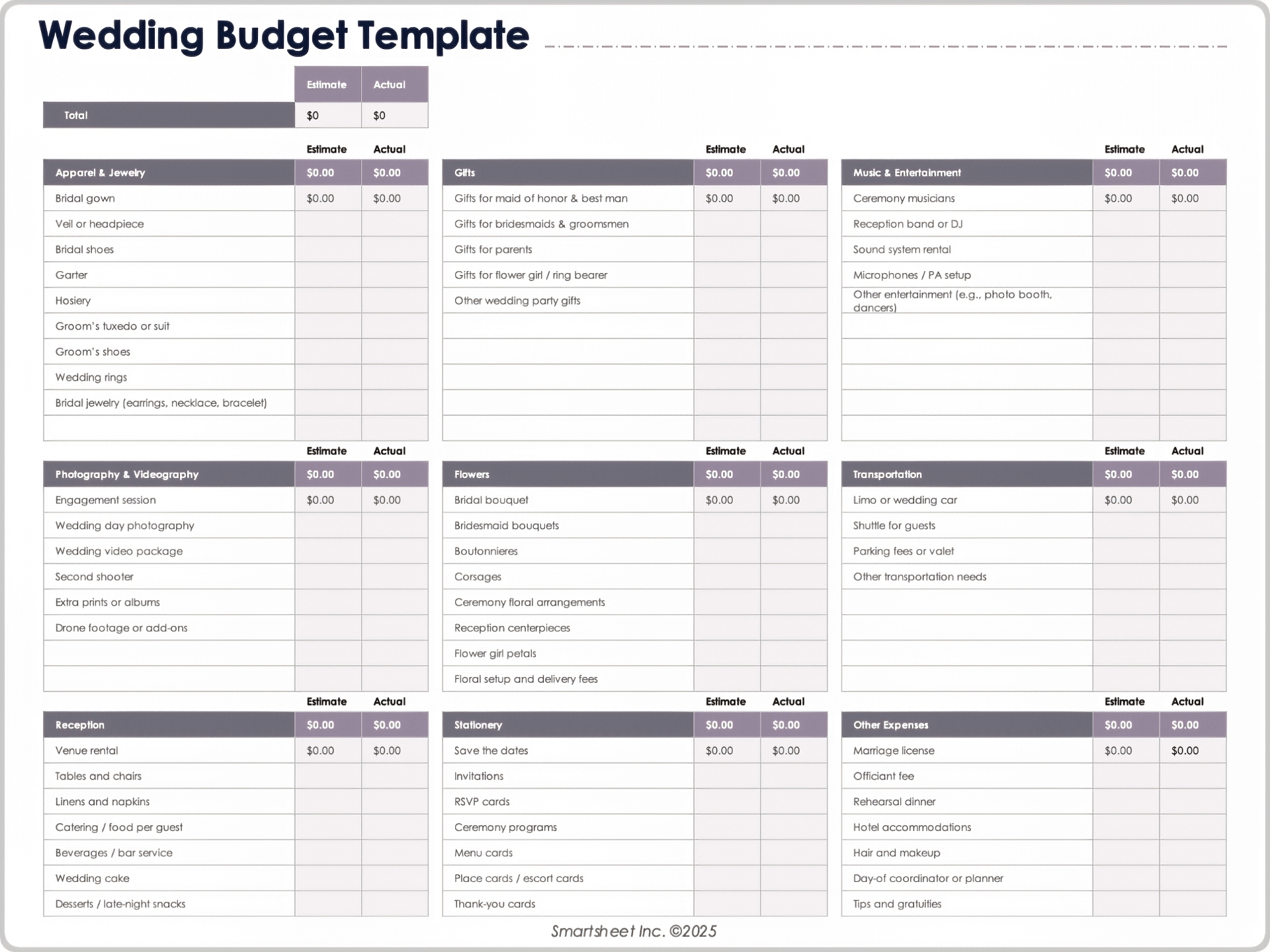
Download a Wedding Budget Template for
Excel
| Google Sheets
When to Use This Template: Designed for wedding planning, this template tracks every cost, from dresses to décor. It’s ideal for couples, planners, or families who want full financial visibility.
Notable Template Features: This template includes categorized sections — such as Apparel, Venue, Catering, Gifts, and Photography — with fields for estimated cost, actual cost, and notes. It also provides total budget tracking and space for custom line items.
Catering Vendor Checklist Template
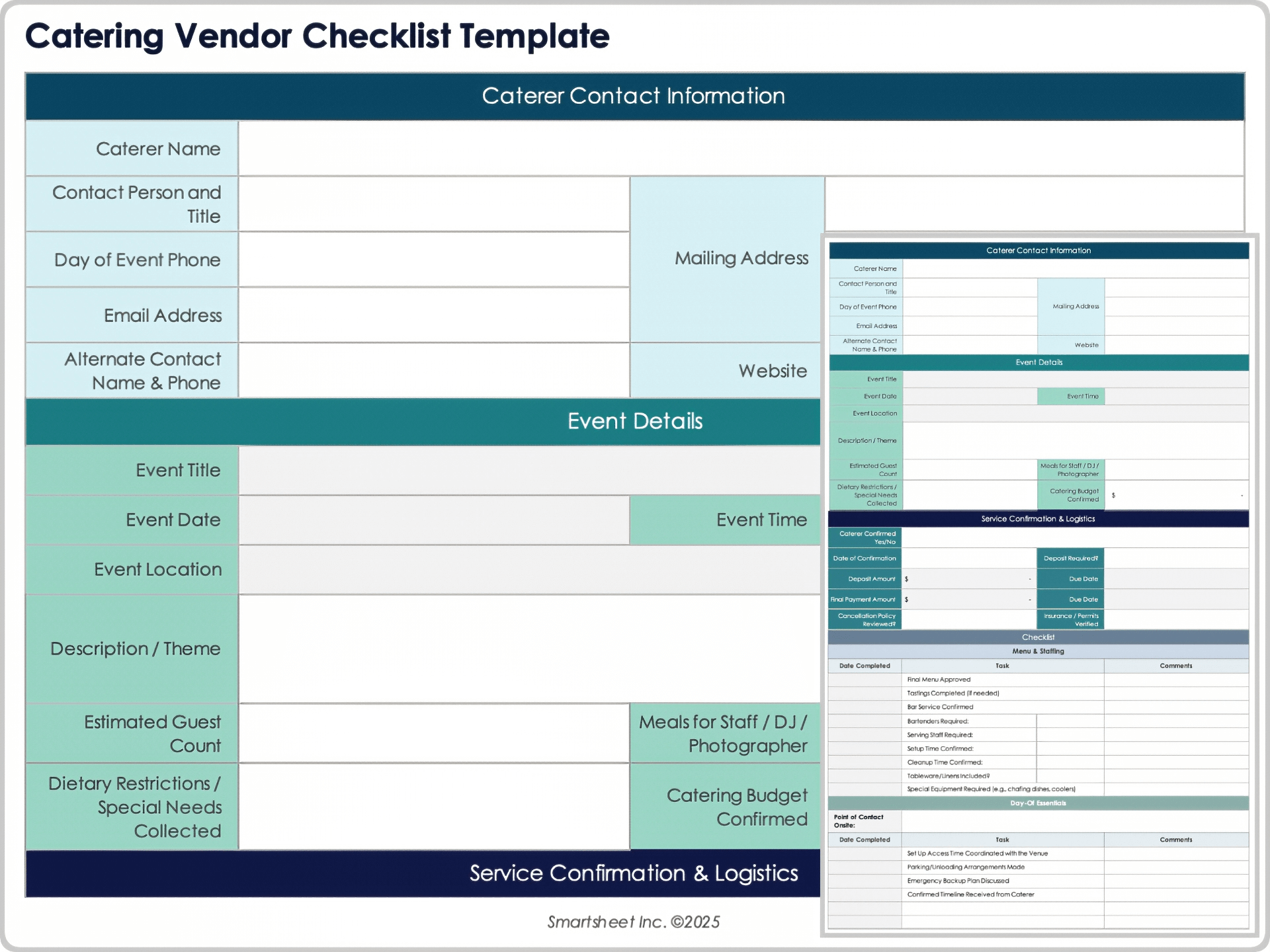
Download a Catering Vendor Checklist Template for
Excel
|
Microsoft Word
|
Adobe PDF
| Google Sheets
When to Use This Template: Use this template to vet, coordinate, and confirm all details with your catering provider. It’s especially helpful for events with on-site meal service or complex food requirements.
Notable Template Features: This template includes fields for caterer information, event details, guest count, dietary needs, deposit and cancellation terms, service schedule, and day-of contact. It ensures all catering logistics are clearly documented and easy to coordinate.
Event Venue Checklist Template
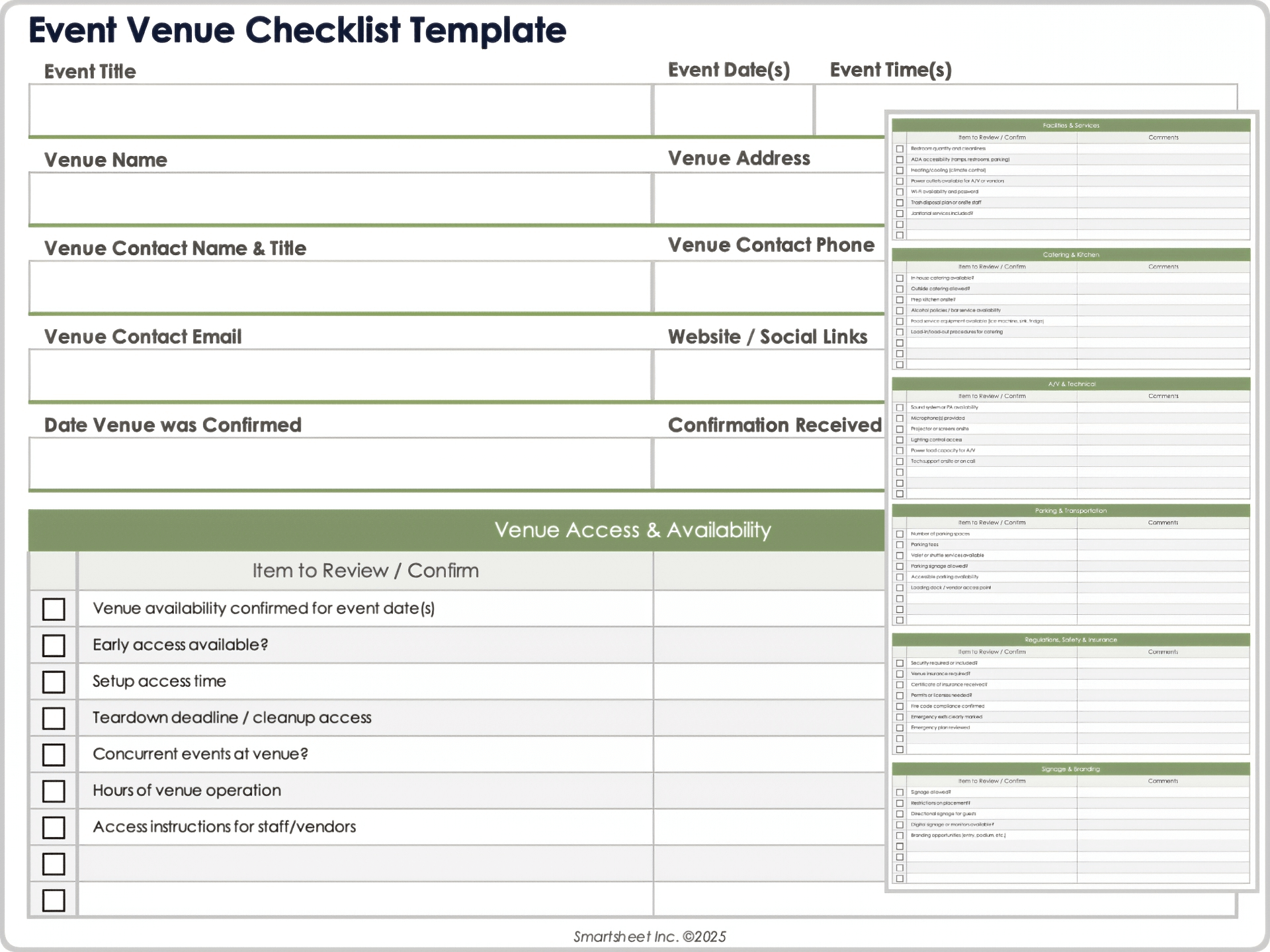
Download an Event Venue Checklist Template for
Excel
|
Microsoft Word
|
Adobe PDF
| Google Sheets
When to Use This Template: Use this venue checklist to evaluate potential sites or confirm key details with a booked location. It’s essential for planners managing logistics such as access, layout, parking, and compliance.
Notable Template Features: This template includes a long-form checklist with items to review or confirm, alongside a comments column for notes or updates. It covers everything from capacity and parking to signage, accessibility, and emergency plans.
What to Include in a Strategic Event Plan
A strategic event plan should include the event’s purpose, target audience, unique value, budget, marketing strategy, and success metrics. Define what you hope to achieve and who the event is for. Tailor your programming to that audience, highlight what makes the event valuable, and outline how you’ll promote it.
The planning process might begin with a brainstorming session as you consider the purpose of your event, what you hope to accomplish, and what resources are available. Find some tips for running this session in this overview of brainstorming techniques.
Here are a few details to include in your plan:
- Purpose of Event: In addition to core event details such as dates, times, venue, and logistics, defining your event’s purpose is essential. Are you aiming to raise funds, educate attendees, launch a product, build brand awareness, or drive sales? Clarifying your goals from the outset helps shape a clear strategy and ensures your planning aligns with measurable outcomes.
- Target Audience: Knowing your target audience and understanding their needs will inform both your planning and promotional efforts. Consider how your event can solve their problems or provide a standout experience compared to competitors.
- Event Benefits and Value: Once you identify your audience, tailor the programming — speakers, activities, entertainment, and messaging — to match their interests. Highlight your event’s unique value proposition to ensure potential attendees see why it’s worth their time and money.
- Event Marketing and Metrics: Map out your marketing strategy by identifying channels — such as social media, email, partnerships, or paid ads — and aligning each with a timeline. Set clear KPIs to evaluate the success of your campaigns and track overall event performance.
- Budget: Create a comprehensive event budget that balances anticipated expenses and projected revenue. Be sure to include line items for fixed and variable costs, as well as contingency funds.
Once an event concludes, a key goal of event management is to gather and analyze performance data. Tracking metrics such as ticket sales, attendance, attendee feedback, and overall execution helps you assess what worked and what didn’t. These insights are essential for improving future events and making data-driven planning decisions.
Increase Event Success With Real-Time Planning in Smartsheet
Empower your people to go above and beyond with a flexible platform designed to match the needs of your team — and adapt as those needs change.
The Smartsheet platform makes it easy to plan, capture, manage, and report on work from anywhere, helping your team be more effective and get more done. Report on key metrics and get real-time visibility into work as it happens with roll-up reports, dashboards, and automated workflows built to keep your team connected and informed.
When teams have clarity into the work getting done, there’s no telling how much more they can accomplish in the same amount of time. Try Smartsheet for free, today.